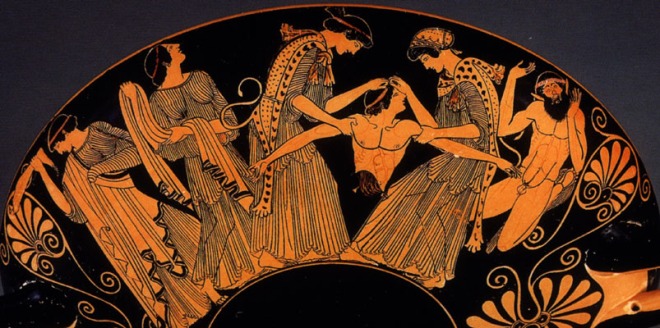Euripides. The Bacchae. 405 BCE. Ancient Greek tragedy.
 There are so many ways in which we can interpret The Bacchae, the ancient Greek tragedy by the great Euripides. At its center, of course, is the conflict between King Pentheus of Thebes and his divine cousin, Dionysius. But the pair are symbols as well as men. Pentheus is the tough-minded, masculine ruler who becomes unreasonable in his insistence on rationality, whereas Dionysius is the effete source of the wild destructiveness that possesses the women of Thebes, and it is he who coolly manipulates and destroys the unbelieving Pentheus in the goriest way imaginable. Pentheus seems to stand for rationality, order, manhood, patriarchy, and the Apollonian; Dionysius for irrationality, chaos, the feminine, and the fluid boundaries of the Dionysian—Eros versus Thanatos, if we dare to invoke Freud and Nietzsche in one breath.
There are so many ways in which we can interpret The Bacchae, the ancient Greek tragedy by the great Euripides. At its center, of course, is the conflict between King Pentheus of Thebes and his divine cousin, Dionysius. But the pair are symbols as well as men. Pentheus is the tough-minded, masculine ruler who becomes unreasonable in his insistence on rationality, whereas Dionysius is the effete source of the wild destructiveness that possesses the women of Thebes, and it is he who coolly manipulates and destroys the unbelieving Pentheus in the goriest way imaginable. Pentheus seems to stand for rationality, order, manhood, patriarchy, and the Apollonian; Dionysius for irrationality, chaos, the feminine, and the fluid boundaries of the Dionysian—Eros versus Thanatos, if we dare to invoke Freud and Nietzsche in one breath.
Yet the truth is more complicated than any such binary. Dionysius has both Apollonian and Dionysian elements; the whole primal bacchanalian madness with which he infects Thebes is an elaborate plot to punish that city’s royal house for casting out his mother after she was impregnated by Zeus. Thus, Dionysius is rational (calculating) in his pursuit of irrationality. As for Pentheus, he is “civilized” but scarcely admirable. Belligerent and intolerant, he denies the divinity of Dionysius and threatens him with death and imprisonment, stupidly and arrogantly scorning the might of the gods. This is hubris. It was Agave who bore her son’s head home.
